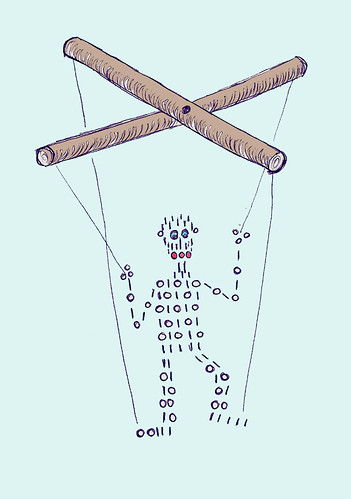
"je digitale alter ego" by verbeeldingskr8
Yesterday, March 25th the GMC published the updated version of Good Medical Practice. And for the first time, supplementary explanatory guidance on the use of social media is also included. The "doctors and social media" guidance was issued in draft last year, was relatively uncontroversial and didn't provoke a lot of discussion. This is what I wrote prior to the publication of the draft guidance.
One line in the final version has received a lot of attention on the twittersphere : "If you identify yourself as a doctor in publicly
accessible social media, you should also identify yourself by name."
Below is the full section from which this comes, followed by the wording of the draft guidance.
Final
17 If you identify yourself as a doctor in publicly accessible social media, you should also identify
yourself by name.Any material written by authors who represent themselves as doctors is likely to be taken on trust and may reasonably be taken to represent the views of the profession more widely.
18 You should also be aware that content uploaded anonymously can, in many cases, be traced back to its point of origin.
Draft
17 If you are writing in a professional capacity, you should usually identify yourself. Any material written by authors who represent themselves as doctors are likely to be taken on trust and/or to represent the views of the profession more widely. You should also be aware that content uploaded anonymously can, in many cases, be traced back to its point of origin.
Why has the wording been changed? The GMC have tweeted that the guidance applies "if you are tweeting as a doctor.Then you should identify yourself. Being open+honest helps maintain trust."
The draft guidance was more ambiguous. What was writing in a 'professional capacity'? And you should 'usually' identify yourself. The final guidance is very clear. For people who have not yet started a blog or joined Twitter this clarity may be useful.
But I don't think that many of us who are online already expected this. The RCGP published the final version of its social media highway code last week where they say that as a general principle doctors should use their professional name online if portraying themselves as a registered doctor, but that use of a pseudonym might be reasonable in some circumstances eg moderating a forum, writing about a sensitive subject, or for when comedy or satire.
What happens if a doctor is currently tweeting under a pseudonym and does not start using their real name before April 22nd when the guidance is enacted? Will they be disciplined or reported? How will the GMC respond? Usually most doctors are confident that they are working within the bounds of good medical practice but this is making some with existing pseudonymous twitter accounts, or blogs, feel uncomfortable. They are now deciding what steps they should take.
I have seen some doctors who tweet in their own names suggest that some might use the anonymity of the internet to raise concerns about patient safety or whistle-blow. Personally, I think that writing a blog post to raise concerns about patient safety would be a last resort after taking the steps which the GMC recommend.
.
What does this guidance mean to you? I allow anonymous comments on this blog.
(By the way, I was glad to see that doctors are not going to be obliged to 'encourage' ill patients back to work -this had been one of the consultation controversies.)
EDIT: reaction from around the web
@GilulaArc, an orthopaedic surgeon, feels that anonymity is essential to protect those dissenting. She wrote a letter to a magazine in her own name which she feels stalled her career. Read more here.
@JobbingDoctor writes that the government sees the professions as people to be controlled. Ensuring doctors only contribute to social media in their own name is part of this. Read more here.
Other reaction collated here.